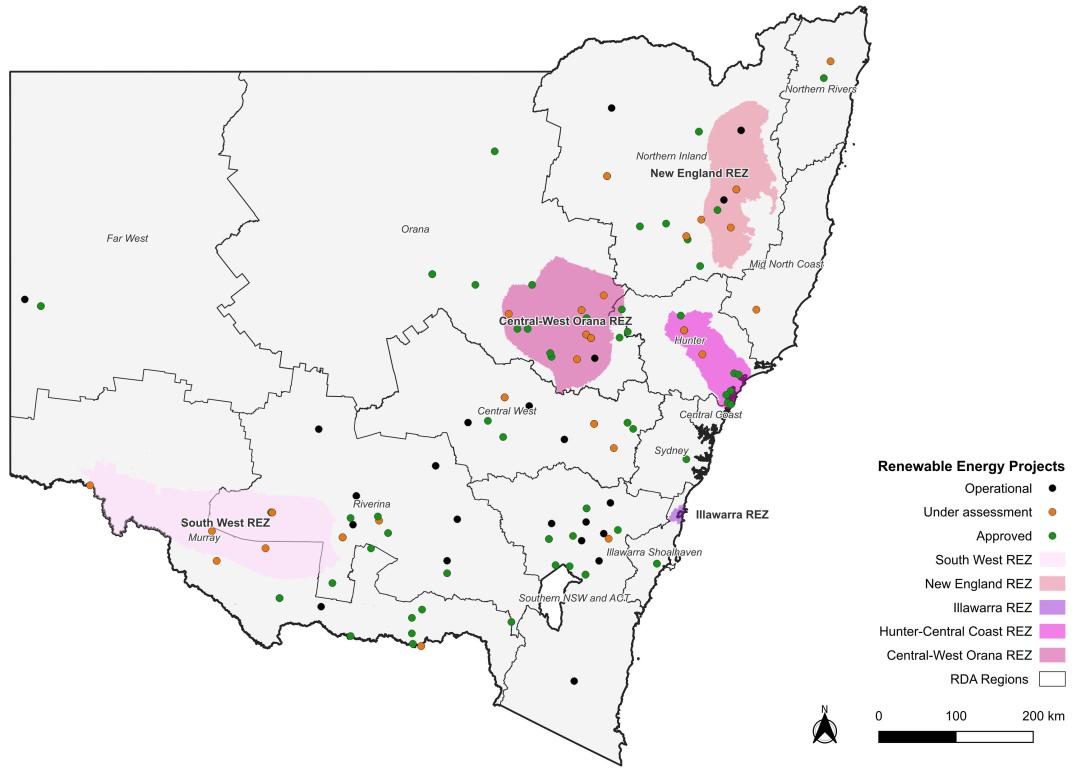New South Wales is undergoing a once-in-a-generation energy transformation, and it's unfolding in the regions. At the heart of this shift is the NSW Government's Electricity Infrastructure Roadmap, a long-term strategy to modernise the state's energy system. Five Renewable Energy Zones (REZs) have been identified, spanning parts of 7 RDA regions and 34 Local Government Areas. EnergyCo has been established to coordinate investment and development across these zones, positioning regional NSW as the engine room of the transition. With 43% of projects in the current pipeline expected to be located within REZs, it is vital regions outside these zones are also given a meaningful voice in the rollout, ensuring equitable participation, benefits, and representation across all communities.
As momentum builds, the scale of activity is striking. Six transmission projects are already approved or operational, shaping where renewable energy projects can take root. Across the state, 122 renewable energy projects spanning solar, wind, battery, and transmission are either approved or under assessment by the NSW Department of Planning, Housing and Infrastructure. Nearly half are solar farms. Regional hotspots are emerging, with Mid-Western, Tamworth, and Dubbo Regional Councils leading in project volume. Workforce demand is rising in the Riverina and Murray RDA regions, with an estimated 15,424 workers required to deliver the current NSW infrastructure pipeline across the state.

Image: Map of renewable energy projects in NSW since 2005 (Source: NSW DPHI May 2025).
Throughout this transition, the RDA NSW Network has been listening. Over time, it has heard first hand from regional communities navigating the rollout of energy infrastructure, stories of opportunity, disruption, and deep concern. To build a clearer picture, RDA NSW and ACT engaged and partnered with the Astrolabe Group to conduct targeted consultations and map the full spectrum of energy projects across the state. These findings were then tested and refined through the lived experience of RDA Chairs and CEOs, grounding the data in regional reality.
This process revealed a critical insight; while the energy transition is accelerating, community engagement is lagging. Stakeholders consistently described consultation processes as superficial, compliance-driven, and lacking genuine dialogue, led by energy proponents on a project-by-project basis, with little regard for local context or long-term impact.
In response, the RDA NSW Network is stepping forward, not just as a voice for regional communities, but as a strategic delivery partner. Through its collaboration with The Energy Charter, which has established the Regional Energy Collaboration Framework, RDAs are supporting the in-region implementation that ensures decarbonisation is locally grounded, inclusive, and accountable. Together, they are strengthening the connective tissue between government, industry, and community, so no one is left behind in the race to net zero.
The Energy Charter and RDAs will:
- Foster trusted partnerships by convening renewable energy and transmission companies with regional communities to build collaborative relationships grounded in transparency and mutual respect.
- Support the co-design process by facilitating engagement between government, energy proponents, and key regional stakeholders to shape inclusive and locally responsive outcomes.
- Embed community priorities by ensuring local input informs formal collaboration commitments, shared action plans, and a robust governance framework, culminating in energy companies entering into participation agreements.
- Deliver enduring governance through the implementation of participation agreements under structures that ensure long-term regional presence and accountability.
- Position RDAs as regional enablers, acting as the central conduit for connection, collaboration, facilitation, and trusted information-sharing across all parties.
The rollout of renewable energy projects will unfold over a 5 to 10-year horizon, with peak activity varying across regions. Implementation of the Regional Energy Collaboration Framework will be incremental, shaped by the pace and scale of the local project pipeline, community sentiment, any redress required, and the delivery milestones set out in the NSW Electricity Infrastructure Roadmap. As this transition progresses, RDA NSW and ACT looks forward to walking alongside regional communities, government, and industry, ensuring the journey to net zero delivers lasting benefits for all.
Note: Case study current as at 28 October 2025.